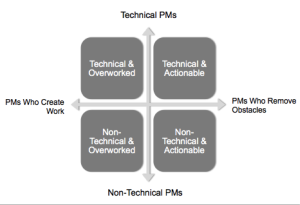I’ve had several conversations lately with software developers or business management regarding project managers, and whether they create work or remove obstacles. As a project manager myself, I’ve felt that removing obstacles and allowing resources to focus on the tasks at hand is one of my top priorities.
In researching this issue, I found a September 2005 article by Scott Berkun “The Art of Project Management: How to Make Things Happen” that highlights that the ability for people to move project forward (AKA remove obstacles) is a skill that some people have, but others do not. Berkun proposes that this skill comes down to knowing how to be a catalyst in many situations, while also having the courage to do it. Additionally, projects move forward more when: prioritization occurs; “no” is accepted and appreciated; open & honest communication occurs; the critical path is known and the PM is relentless & savvy.
A more recent article published March 16, 2015 in MITSloan Management Review by Alexander Laufer, Edward Hoffman, Jeffrey Russell & W. Scott Cameron “What Successful Project Managers Do” emphasizes the organizational responsibility required to allow project managers to be flexible. This research article states that project managers need to: develop collaboration; integrate planning & review with learning; prevent major disruptions and maintain forward momentum. This ultimately results in a more fluid, adaptive project.
As projects have become significantly more technical in nature, the divide between project managers who create work or remove obstacles has become more pronounced. Technical implementation projects push this even further. As project leaders, we need to recognize the impact of technical skill and the too many active projects on ability to manage a project to its completion. There are 4 combinations on the technical skill to execution matrix:
- Technical but Overworked – These project managers have the skill, but are not capable of removing obstacles because there are too many other projects on her plate.
- Technical & Actionable – These are the technical project managers that are able to remove obstacles for their team. Often these resources get overlooked by the project team as they are seen as just doing their job.
- Non-Technical & Actionable – These resources tend to be PMI certified so know the mechanics of managing a project, are able to remove obstacles without needing to fully understand the technical pieces.
- Non-Technical & Overworked – These project managers also tend to be PMI certified so know the mechanics, but are overworked so they can’t focus on removing obstacles. Ultimately these pieces get pushed to project resources.
As a technical project manager, I have some bias about which quadrant the rockstars reside. However, there are some strong non-technical project managers who are able to successfully complete projects. This requires management support and a level of organizational prioritization that is really difficult.
